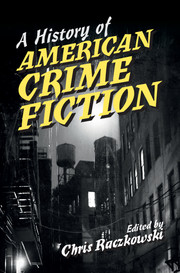Book contents
- A History of American Crime Fiction
- A History of American Crime Fiction
- Copyright page
- Contents
- Contributors
- Acknowledgments
- Introduction
- Part I Early American Era
- Part II Romantic Era
- Part III Realist Era
- Part IV Modernist Era
- Chapter 11 Criminal Modernism
- Chapter 12 American Golden Age Crime Fiction
- Chapter 13 Red Harvest
- Chapter 14 Stateless Mothers/Motherless States
- Chapter 15 One of Us
- Part V Postmodernist Era
- Index
- References
Chapter 14 - Stateless Mothers/Motherless States
The Femme Fatale on the Threshold of American Citizenship
from Part IV - Modernist Era
Published online by Cambridge University Press: 27 October 2017
- A History of American Crime Fiction
- A History of American Crime Fiction
- Copyright page
- Contents
- Contributors
- Acknowledgments
- Introduction
- Part I Early American Era
- Part II Romantic Era
- Part III Realist Era
- Part IV Modernist Era
- Chapter 11 Criminal Modernism
- Chapter 12 American Golden Age Crime Fiction
- Chapter 13 Red Harvest
- Chapter 14 Stateless Mothers/Motherless States
- Chapter 15 One of Us
- Part V Postmodernist Era
- Index
- References
- Type
- Chapter
- Information
- A History of American Crime Fiction , pp. 192 - 204Publisher: Cambridge University PressPrint publication year: 2017



